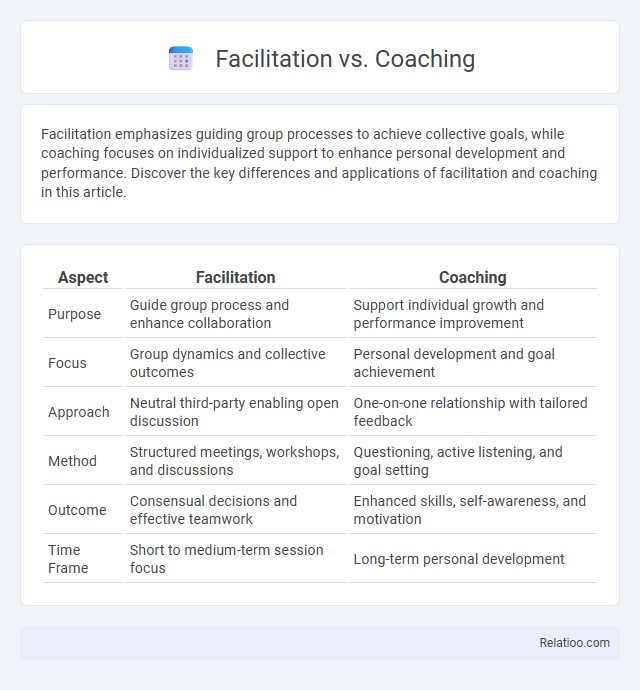Facilitation emphasizes guiding group processes to achieve collective goals, while coaching focuses on individualized support to enhance personal development and performance. Discover the key differences and applications of facilitation and coaching in this article.
Table of Comparison
| Aspect | Facilitation | Coaching |
|---|---|---|
| Purpose | Guide group process and enhance collaboration | Support individual growth and performance improvement |
| Focus | Group dynamics and collective outcomes | Personal development and goal achievement |
| Approach | Neutral third-party enabling open discussion | One-on-one relationship with tailored feedback |
| Method | Structured meetings, workshops, and discussions | Questioning, active listening, and goal setting |
| Outcome | Consensual decisions and effective teamwork | Enhanced skills, self-awareness, and motivation |
| Time Frame | Short to medium-term session focus | Long-term personal development |
Understanding Facilitation: Definition and Scope
Facilitation involves guiding a group process to achieve collective goals by promoting open communication, collaboration, and problem-solving, distinct from coaching which focuses on individual growth and performance improvement. Understanding facilitation requires recognizing its scope in managing group dynamics, fostering inclusive participation, and ensuring efficient decision-making without imposing solutions. Your engagement as a facilitator centers on creating an environment where participants can contribute ideas freely and reach consensus effectively.
What is Coaching? Key Concepts Explained
Coaching is a personalized developmental process aimed at enhancing an individual's skills, performance, and potential through goal-oriented conversations and feedback. Key concepts include active listening, powerful questioning, and fostering self-awareness to enable clients to find their own solutions. Unlike facilitation, which guides group processes, coaching focuses on one-on-one engagement to unlock personal growth and achievement.
Core Differences Between Facilitation and Coaching
Facilitation centers on guiding group discussions and processes to achieve collaborative outcomes, while coaching focuses on one-on-one development to unlock Your personal potential and performance. Facilitation involves managing group dynamics and ensuring balanced participation, whereas coaching emphasizes individualized goal-setting and skill enhancement through tailored feedback. The core difference lies in facilitation's role in enabling collective progress and coaching's concentration on personal growth and behavior change.
Roles and Responsibilities: Facilitator vs Coach
A facilitator guides group processes to ensure effective communication, collaboration, and achievement of collective goals, focusing on managing dialogues and removing barriers. A coach provides personalized support by enhancing an individual's skills, mindset, and performance through goal-setting, feedback, and accountability. While facilitators emphasize group dynamics and neutral guidance, coaches prioritize individual development and transformation.
Skills Required for Effective Facilitation
Effective facilitation requires strong communication, active listening, conflict resolution, and group dynamics management skills to guide discussions and ensure inclusive participation. Unlike coaching, which focuses on personalized development and goal-setting, facilitation demands the ability to remain neutral while steering collaborative processes. Your success as a facilitator depends on these skills to foster engagement, clarity, and productive outcomes in diverse group settings.
Essential Coaching Competencies
Facilitation emphasizes guiding group processes to achieve collective goals, while coaching focuses on individual growth using Essential Coaching Competencies such as active listening, powerful questioning, and goal setting. Your coaching experience benefits from mastering these competencies, enabling you to foster self-awareness and accountability in clients. Effective facilitation and coaching intersect in communication skills but cater to different outcomes: group dynamics versus personalized development.
When to Use Facilitation vs Coaching
Facilitation is ideal for guiding group discussions and decision-making processes to achieve collective goals, whereas coaching is best suited for one-on-one personal or professional development aimed at enhancing individual performance. Use facilitation when managing team dynamics, fostering collaboration, or reaching consensus during meetings or workshops. Opt for coaching when addressing specific skills, career growth, or behavioral change through personalized support and feedback.
Benefits and Limitations of Facilitation
Facilitation enhances group collaboration by guiding discussions and ensuring balanced participation, benefiting decision-making processes and conflict resolution but may be limited by the facilitator's neutrality and reliance on group dynamics. Coaching focuses on individual growth, tailored feedback, and skill development, offering personalized support but lacking the collective engagement found in facilitation. Your choice depends on whether you prioritize group synergy through facilitation or personalized development via coaching.
Advantages and Drawbacks of Coaching
Coaching offers personalized development by focusing on individual strengths and tailored goal-setting, which enhances motivation and accountability; however, it can be time-intensive and costly compared to group-oriented facilitation methods. While facilitation promotes collaborative problem-solving and collective decision-making, coaching provides deeper self-awareness and targeted skill-building that may not emerge in group settings. The main drawback of coaching lies in its dependency on the coach's expertise and the coachee's commitment, potentially limiting effectiveness if either party is not fully engaged.
How to Choose the Right Approach: Facilitation or Coaching?
Choosing between facilitation and coaching depends on your specific goals and the needs of your team or individual. Facilitation is ideal for guiding group discussions, ensuring productive collaboration, and aligning diverse perspectives towards a common objective. Coaching focuses on personal development, enhancing skills, and unlocking potential through tailored one-on-one support, helping you achieve targeted growth and performance outcomes.

Infographic: Facilitation vs Coaching
 relatioo.com
relatioo.com